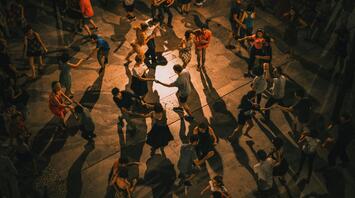An Insider's Guide to Queer Tango in Buenos Aires

Tango, with its intense expressions and intricate steps, is deeply ingrained in Buenos Aires' culture. From elegant ballroom competitions to lively milonga events in colorful neighborhoods, the dance reflects the city's spirit.
Originally a dance born from European immigrants in the early 1900s, tango evolved into a symbol of Argentine identity. Initially same-sex tango was common among men due to social norms, but the Tango Queer movement revived its roots, embracing LGBTQ+ inclusivity.
Buenos Aires' queer tango scene is not just about dancing; it's a celebration of diversity and resilience, reflecting the city's progressive spirit.
Anahí Carballo, director of Tango Cuir studio, shares her insights into Buenos Aires' queer tango community, which has become a vibrant part of the city's cultural landscape.
Exploring Queer Tango Spaces
- Muchaches - San Telmo: Located in the historic San Telmo neighborhood, Muchaches hosts a weekly milonga in an old house close to Plaza Dorrego. It's a working-class barrio known for its cultural richness and bohemian atmosphere. Led by experienced instructor Edgardo Fernández Sesma, Muchaches welcomes all but is hosted in Lugar Gay, a hostel catering to same-sex male couples.
- Casa Brandon & Feliza: Special queer tango classes often take place in LGBTQ+ spaces like Casa Brandon and Feliza. Milonga Brandon, led by iconic dancer Soledad Nani, is held at Casa Brandon, a hub for promoting inclusivity and equal rights. Tango Para Todes, at Feliza, offers a range of LGBTQ+ events, including queer tango sessions and social gatherings.
- Buenos Aires Queer Tango Festival: For an immersive experience, Carballo recommends the annual Queer Tango Festival held in December. Organized by Tango Queer movement leaders Mariana Docampo and Augusto Balizano, the festival offers workshops, live music, dance performances, and more, providing a comprehensive view of the queer tango community.
- Despelote Tango Queer - Palermo: Despite economic challenges, Buenos Aires maintains a lively nightlife scene, including queer tango events. Despelote Tango Queer, held at Libario Cultural Centre, offers a welcoming space for tango enthusiasts every Monday, showcasing the resilience of the city's cultural offerings.
Tango World Championships: Witness the best of tango at the annual Tango World Championships in August. While LGBTQ+ partners remain a minority, same-sex couples have participated since 2013. The event offers a glimpse into the world of professional tango, with queer dancers making their mark despite challenges.



















